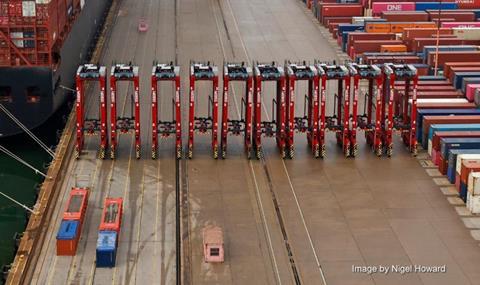
DP World’s container terminal at Southampton has eliminated fossil diesel from its operations in favour of hydrotreated vegetable oil (HVO), which it estimates will cut 14,000 tons of CO2 annually.
The move follows a trial of HVO at the port last year, which saw it used in its forklift trucks, refrigerated unit generators and straddle carriers.
DP World Southampton is the first British port to replace diesel with vegetable oil, according to the company.
It calculates that the move will see a net carbon dioxide reduction of more than 80%, as well as significantly reducing nitrogen oxide, particulate matter and carbon monoxide.
John Trenchard, DP World UK supply chain director, said: “I am delighted that we have successfully made the leap to fuelling all of our fleet and installations at Southampton with HVO.
Read more
- Transmec UK to open hub at DP World’s London Gateway logistics park
- DP World sees record rise in volumes at London Gateway and Southampton hubs
- DP World reports soaring demand as London Gateway lands second major tenant
“This innovation shows our determination to continue playing our part in helping the UK meet its target of delivering the government’s Net Zero 2050 policy and improving local air quality.
“We estimate that using HVO will save around 14,000 tons of carbon dioxide on an annualised basis - the equivalent of taking over 8,000 family cars off UK roads each year.
“We have a clear responsibility to reduce the impact of our operations and offer customers solutions that support their own sustainability journeys, which is why we are working with our supply chain partners to accelerate the transition to green energy.”
He called on DP World customers to follow suit. “DP World Southampton moves more than one quarter of all containers by rail and we are encouraging other customers to embrace this modal shift," he said.
“Taken together with DP World London Gateway, we take 300,000 trucks off UK roads each year and every additional daily train we can fill saves up to 6,000 tons of carbon dioxide per year.”
DP World said HVO is being used as an interim solution with the company currently trialling electric and hydrogen. It added that its new Berth Four at London Gateway could be 100% electric on completion in 2024.














